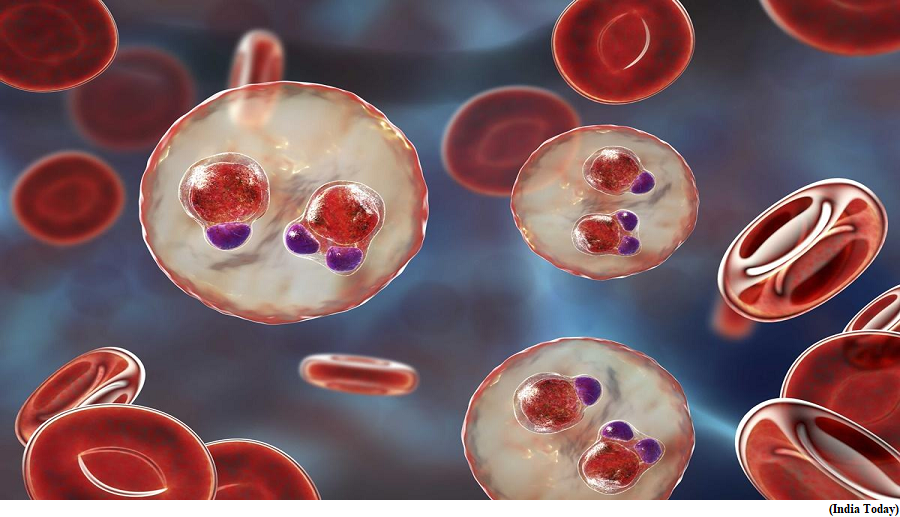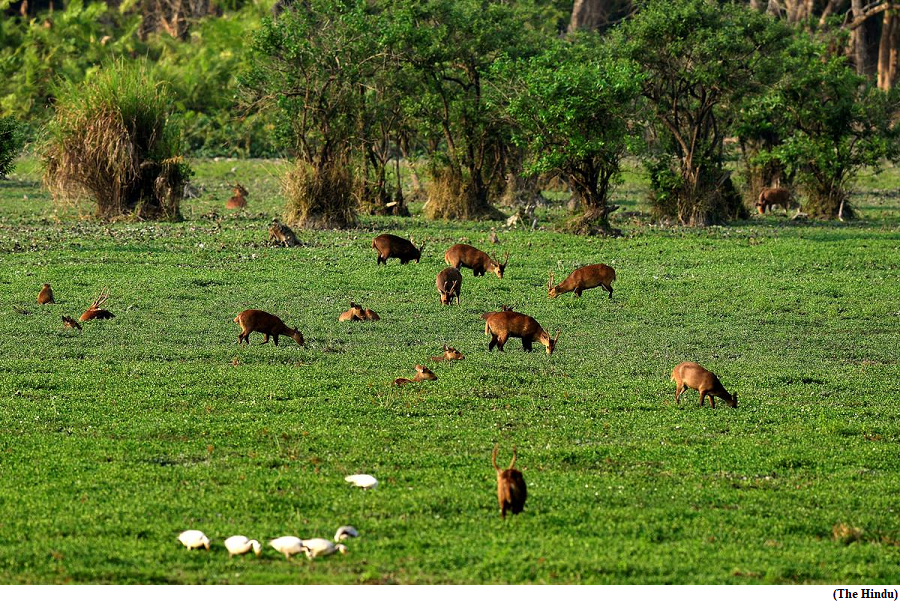JNU researchers find novel way to stop fatal malaria transmission (GS Paper 2, Health)

Why in news?
- Researchers at the Jawaharlal Nehru University (JNU) have found a new way to block the transmission of fatal malaria parasites.
- They found a new compound that showed potent transmission-blocking activity.
Details:
- JNU researchers have identified a novel cold shock protein of Plasmodium falciparum, which plays an essential role in the sexual and asexual development of malaria parasites.
- Since the malaria parasite experiences low-temperature stress in mosquitoes, this protein provides a protective covering to the parasite against cold conditions.
Malaria:
- The mosquito-borne disease, malaria, is caused by a parasite, which grows and multiplies first in the liver cells and then in the red cells of the blood.
- The parasite grows in the red blood cells, multiplying and further invading.
- Four kinds of malaria parasites infect humans: Plasmodium falciparum, P. vivax, P. ovale, and P. malariae.
Cold shock proteins:
- To combat the adverse effects of low temperatures, cold shock proteins are expressed in bacteria, plants, and humans that play a crucial role in acquiring cold tolerance.
- Cold shock proteins are known to destabilize secondary structures in target RNA which in turn allow efficient transcription and translation.
- Scientists have now proposed that targeting this essential Plasmodium cold shock protein with LI71 can block the growth and transmission of malaria parasites.
Outcome of research:
- They have achieved a significant milestone in the development of a transmission-blocking anti-malarial agent.
- Plasmodium falciparumfCoSP (PfCoSP) is a cold shock protein of the malaria parasite that was found to play a pivotal role in adapting the parasite to cold stress conditions inside the mosquito host. Blocking this protein by LI71 would thus break the transmission cycle among mosquitoes.
Way Forward:
- Research is ongoing in enhancing anti-malarial drugs as the parasite has developed coping mechanisms against it. Resistance to currently available anti-malarial drugs urge additional drug lead identification efforts and further research into this deadly disease.
- They hope that their new work could pave way for targetting drug-resistant parasites.
Proposal for Sabarimala greenfield airport receives Central approval
(GS Paper 3, Infrastructure)
Why in news?
- The plan to establish the Sabarimala greenfield airport at Erumely has received a major boost with the project proposal receiving approval from the Union Ministry of Civil Aviation.
- The approval was granted after reviewing the techno-economic feasibility study report presented by the Kerala government.

Details:
- The proposed airport will have a 3.5-km-long runway with adequate width to enable the operation of aircraft of all sizes.
- Upon completing land acquisition, the detailed project report will be formulated, followed by the constitution of a Special Purpose Vehicle to execute the project.
Land acquisition:
- As per a recent government order, 2,570 acres of land in Erumely South and Manimala villages will be acquired for the airport, including 307 acres of land outside the Cheruvally Estate.
- Although a civil dispute is pending in a sub-court between the government and Believers’ Church over the ownership of the estate, which constitutes a major portion of the project area, it is unlikely to impact the acquisition process under the The Land Acquisition, Rehabilitation, and Resettlement (LARR) Act as the government can proceed with the acquisition by depositing the property’s value in the court.
Way Forward:
- At present, the social impact assessment (SIA) study for the project is in its final stage, while the environment impact assessment (EIA) is nearing completion.
About RFCTLARR Act:
- The Department of Land Resources in the Ministry of Rural Development is the nodal agency for matters relating to land acquisition.
- Acquisition of land for various projects is done by concerned State Governments/ UT Administrations as per provisions laid down in the Land Rehabilitation Act, 1894 as well as under the Right to Fair Compensation and Transparency in Land Acquisition, Rehabilitation and Resettlement Act, 2013 (RFCTLARR Act, 2013).
Army may build Bailey bridges in Kaziranga to protect rhino’s domain
(GS Paper 3, Environment)
Why in news?
- The Army may help build Bailey bridges in the Kaziranga National Park and Tiger Reserve for faster movement of forest guards in strategic, vulnerable pockets of the one-horned rhino domain.
- The Eastern Command of the Army has received a request from the Kaziranga authorities for setting up three Bailey bridges within the park.

Key Highlights:
- Bailey bridges sought would essentially replace wooden structures in flood-prone vulnerable pockets of the 889.51-sq.km park, also a UN World Heritage Site.
- These bridges would be at Mihi in Kohora, Kathparaghat in Bagori, and Rongamotia in the Agoratoli sector of the park.
- All the bridges would be 4 metres wide and between 30 metres and 100 metres in length.
Why Bailey bridges?
- Kaziranga has a total of 223 anti-poaching camps. Many of them are inundated during the floods. It may be a permanent solution to a communication problem, specifically during the floods.
- The bridges, off the tourist circuit tracks, are required for better connectivity in primarily inaccessible areas where wooden structures are often washed away during the monsoon.
- The bridges are expected to shorten the routes to the vulnerable pockets and facilitate better coordination among the forest guards manning the anti-poaching camps.




